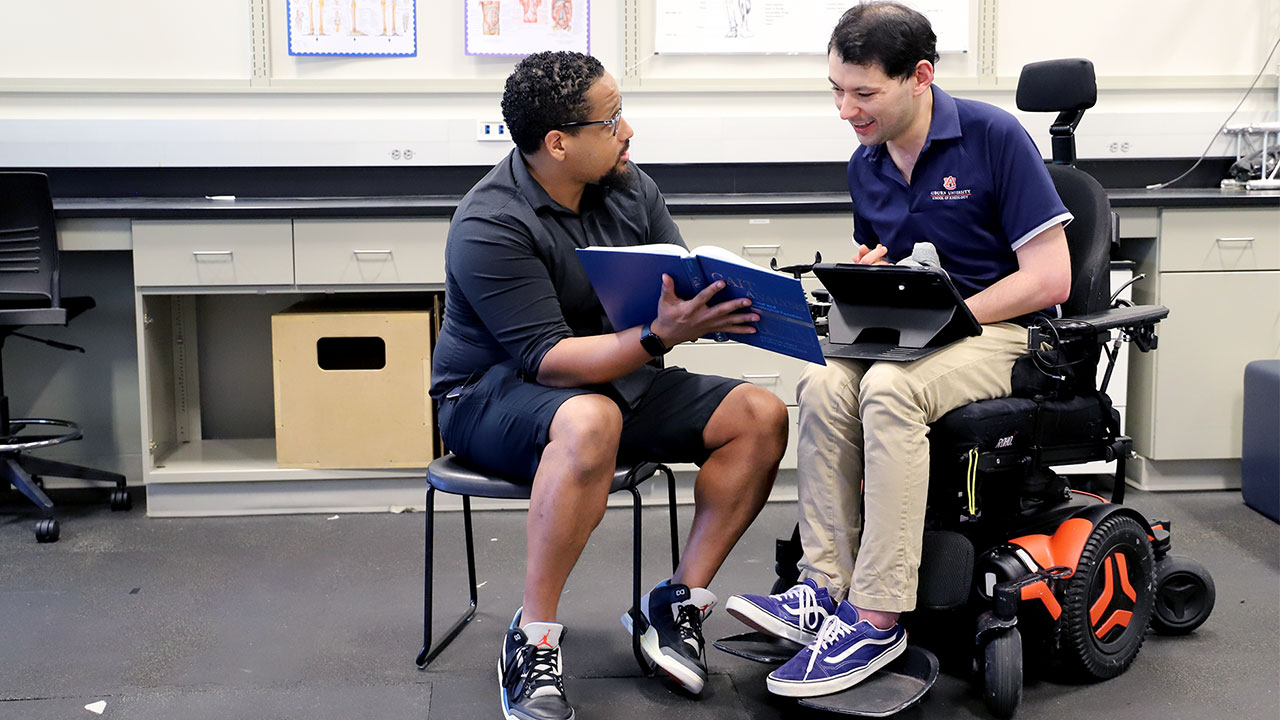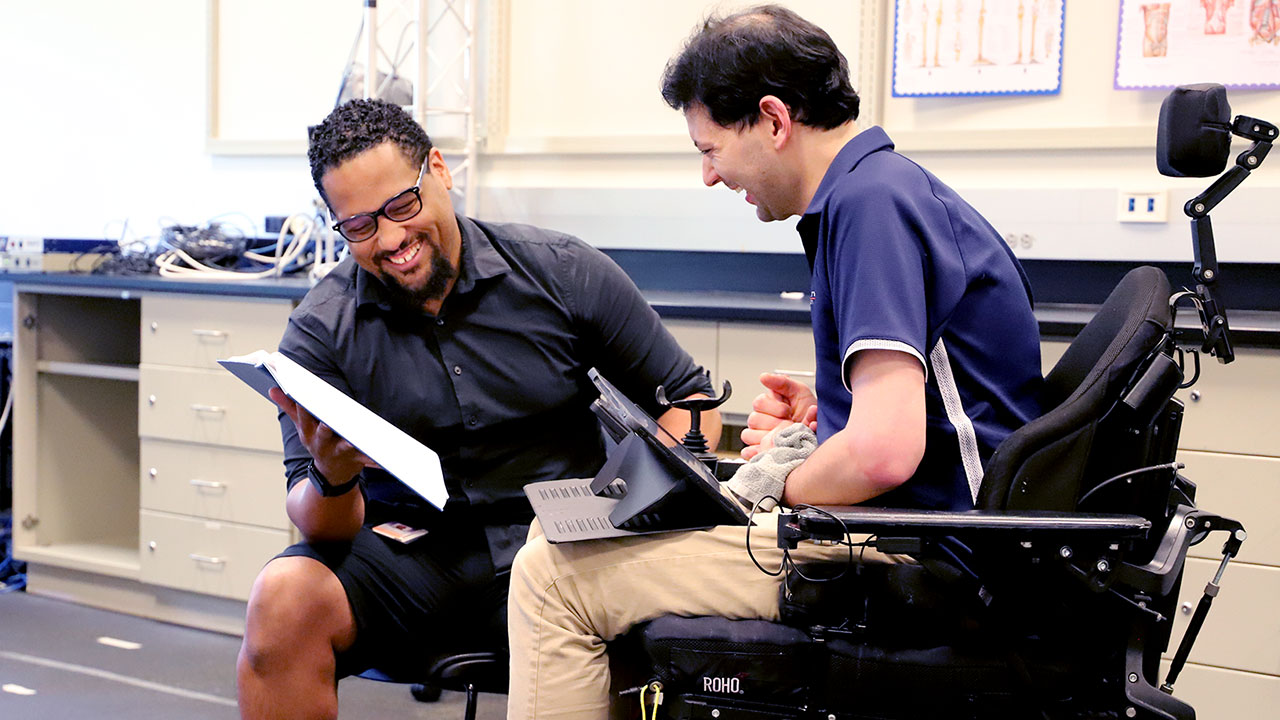content body

Christopher Wilburn, an associate clinical professor of biomechanics in Auburn’s School of Kinesiology (left), examines a book with student Matt Beth, who is pursuing his doctorate while leading research in the field of traumatic brain injury.
Nine years ago, Matt Beth never would have thought he’d be here— not in a doctoral program, not conducting research, and certainly not rewriting the narrative of his own life with the help of a very special mentor.
It was 2016 when Beth sustained a traumatic brain injury after falling off a building, resulting in his inability to speak, walk and use the left side of his body. But today, Beth doesn’t just survive; he thrives in Auburn University’s College of Education and its School of Kinesiology.
The secret to his success? Beth, who uses a special computer-assisted device to speak, smiles proudly as his eyes light up and the electronic voice he cues praises the name of his mentor and former professor, Christopher Wilburn.
“Without Dr. Wilburn’s guidance and encouragement to further advance my education, I would have felt extremely fortunate to have earned my undergraduate degree only, and I would have never seen more for myself,” Beth said. “Now, I have had six great years at Auburn and a bright future ahead of me, and it’s all thanks to the support and encouragement that Dr. Wilburn has given me.”
Beth quickly added that “Outside of my family members, Dr. Wilburn was the first person who believed that I was meant to achieve so much more in my life.”
Life-changing mentorship
Wilburn, an associate clinical professor of biomechanics in Auburn’s School of Kinesiology, said his feelings of great respect are mutual, noting how he vividly recalls Beth’s enthusiasm after he challenged him to consider furthering his academic pursuits.
“I remember when I told him the option of getting a PhD, I would say 24 hours later he sent me this really long email telling me the studies he wanted to conduct,” said Wilburn, a graduate advisor of exercise science and assistant director of the Sport Biomechanics Laboratory. “Getting students that find the same excitement that I get in biomechanics, there’s nothing better than that.”
Beth first encountered Wilburn in an undergraduate biomechanics course. What began as a classroom experience quickly evolved into a life-changing mentorship.
“I was very fortunate to have even been in the class as my doctors had told me that I would never be able to complete my undergraduate degree,” Beth said. “Despite this negative prognosis, Dr. Wilburn strongly encouraged me to advance my education beyond my undergraduate degree.”
“This may seem exaggerated or hyperbolic, but I genuinely and sincerely mean it when I say the words that come to mind when I think of Dr. Wilburn’s impact on my life are ‘pivotal’ and ‘monumental.’”
A shared journey
Wilburn’s philosophy is simple and profound: mentorship is a shared journey.
“I see my mentorship as a collaboration and rapport to allow them to carry the torch to newer heights that will eventually serve the world for greater good,” he said.
Beth is currently in the process of completing his dissertation for his doctorate at Auburn’s School of Kinesiology. His area of focus “examines the impact of the mechanism of traumatic brain injury on one's functional independence and subsequent disability.”
Wilburn said Beth is a testament to why he loves his job. Wilburn said his teaching is rooted in trust, collaboration and the power of possibility. And he actively dismantles traditional academic hierarchies.
“What students have told me is professors try to stay up here,” he said, gesturing upward, “and they expect the students to kind of climb up there. But my perspective is, yes, I’m up here, and the only reason I’m up there is because I’ve had more experience within the field. I’ll drop down and we can climb up that ladder together. It’s really showing them it just takes time and practice, and you can be great in whatever you want to do.”

A ladder to success
That ladder became a lifeline for Beth.
“This may seem exaggerated or hyperbolic, but I genuinely and sincerely mean it when I say the words that come to mind when I think of Dr. Wilburn’s impact on my life are ‘pivotal’ and ‘monumental,’” Beth said.
Wilburn said he encourages curiosity among his students.
“One thing that I love about students is when they develop that trust and want to explore more,” he said. “And that’s exactly what the laboratory setting does. It really allows them to be curious and answer questions in a way that they really want to.”
Wilburn, a New York native, is the primary instructor for all undergraduate biomechanics courses at Auburn, and he also maintains a research line investigating the influence footwear, socks, and foot architecture have on lower extremity gait mechanics. Wilburn holds his Bachelor of Arts, Kinesiology, from Morehouse College and both his Master of Education, Biomechanics, and Doctor of Philosophy, Biomechanics, from Auburn.
Wilburn said his approach to teaching and mentoring aligns perfectly with the College of Education’s motto of Opening Doors and Improving Lives.
“I want to break down all barriers for students,” he said. “I want them to understand that just because I may have gone through some difficulties or they have gone through some intellectual difficulties, that doesn’t have to be present for them.
“I want to eliminate as many barriers as possible, thus the doors are already open to them. And I want them to see that there may be doors that exist that they don’t even understand nor see. So, I want to provide that perspective for them so they can then pass that forward.”




